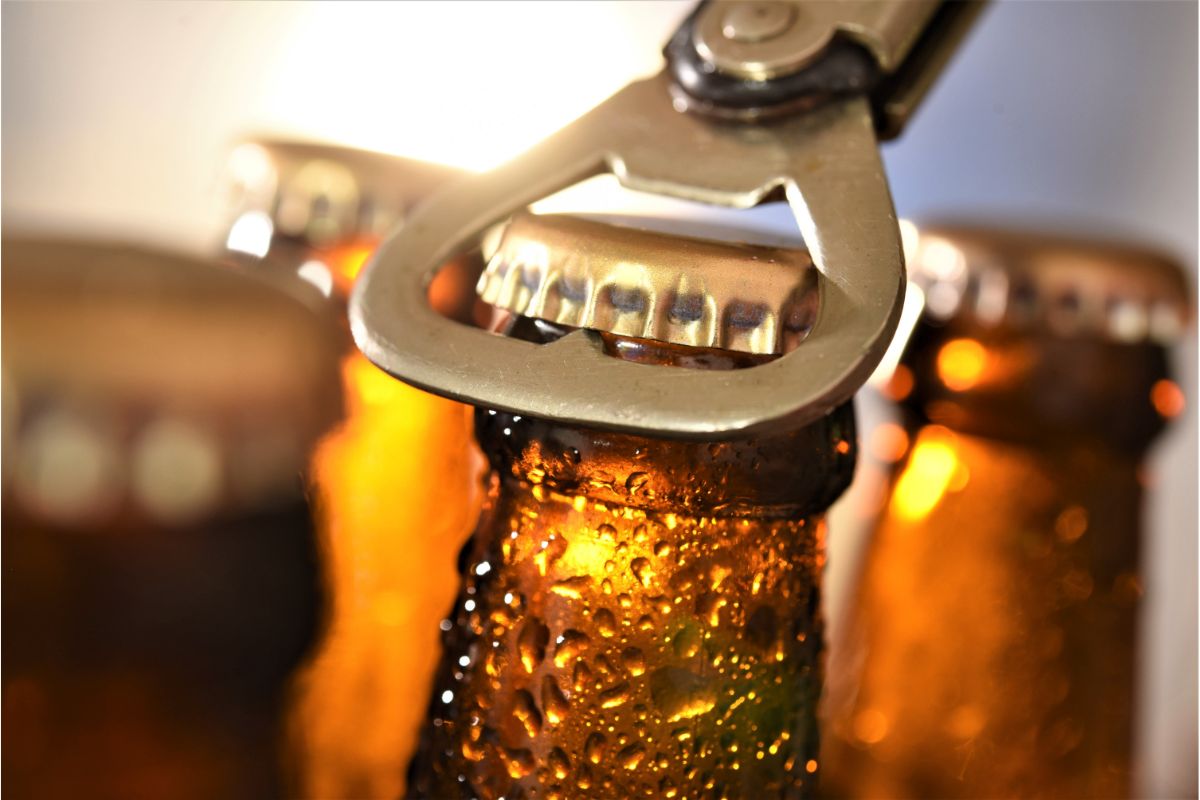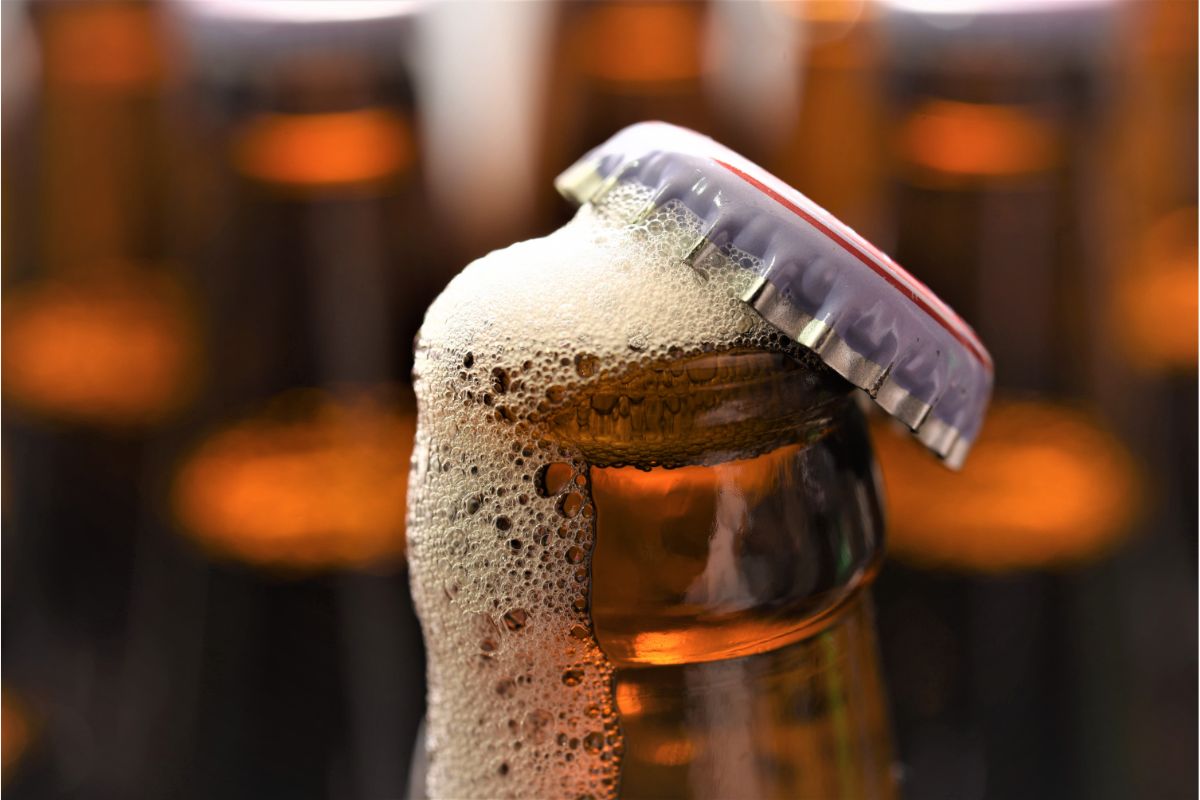Are you a fan of bottled beer? Well, who isn’t, right? Whether it’s a refreshing pilsner, a hoppy IPA, or a rich stout, bottled beer is a go-to beverage for many of us.
But have you ever wondered how long your bottled beer will last before it goes bad?

We get it, you want to enjoy your beer at its best. That’s why we’ve put together this article to help you understand the lifespan of bottled beer and how to make sure you’re drinking it at its peak.
So, grab a cold one, and let’s dive in!
What Affects The Shelf Life Of Bottled Beer?
As much as we all love beer, it’s important to understand that it has a limited shelf life and be aware of the several factors that can affect its stability and ultimately influence its lifespan.
What are those? Let’s find out!
Ingredients In Beer That Affect Its Shelf Life
To begin with, you should know that beer is made up of four main ingredients: water, yeast, malt, and hops.
However, certain types of hops and malt are more stable than others, which can affect the beer’s longevity.
Not only that but some beers may also contain ingredients like fruit, spices, or even coffee, which can have a shorter lifespan than traditional beer ingredients.
Factors That Affect The Stability Of Beer
In addition, there are many external factors that can also affect the stability of beer.
The most important ones are light exposure, oxygen, and temperature; exposure to light might allow the hops in the beer break down, which will then result in the beer having an ‘off’ taste; oxygen can lead to oxidation, which can result in a stale or cardboard-like flavor; and temperature can affect the yeast in the beer, which can result in off-flavors and aromas.
Importance Of Storage Conditions
So, as you can understand, the storage conditions of beer are crucial in ensuring its longevity.
For starters, beer should be stored in a cool, dark place away from direct sunlight, as exposure to light and heat can cause it to spoil.
As for the temperature, a temperature range of 40-55°F (4-13°C) is ideal for storing beer, as this helps to slow down the chemical reactions that can lead to spoilage.
Last but not least, you should store your beer bottles (see also: How Tall Are Beer Bottles?)upright to prevent the yeast sediment from settling at the bottom of the bottle and affecting the flavor of the beer.
So, now that we understand what affects the shelf life of bottled beer, let’s take a closer look at the best-by date and whether it’s safe to consume beer past that date.
Understanding The Best-By Date
Beer manufacturers typically include a best-by or expiration (see also: Does Beer Expire?)date on their products to indicate the optimal time frame for consumption.
But what exactly does this date mean, and is it safe to consume beer past this date?
Explanation Of The Best-By Date
The best-by date on a bottle of beer is the manufacturer’s estimate of the optimal time for consumption.
It’s important to note that this date is not an expiration date, but rather a suggestion for when the beer is at its peak flavor and aroma.
How The Best-By Date Is Determined
The best-by date is determined by the beer manufacturer based on a variety of factors, including the ingredients used, the brewing process, and the expected lifespan of the beer.
However, keep in mind that the best-by date is not a guarantee of quality, but rather an estimate.

Is It Safe To Consume Beer Past The Best-By Date?
In general, it is safe to consume beer past its best-by date, as long as it has been stored properly. However, the flavor and aroma of the beer may begin to deteriorate after this date, and it may no longer be at its peak quality.
In addition to that, we should let you know that certain types of beer, such as hoppy or fruity beers, may deteriorate more quickly than others and may not be enjoyable to drink past the best-by date.
So, What Is The Shelf Life Of Bottled Beer?
The lifespan of bottled beer (see also: How Many Ounces In A Bottle Of Beer?)can vary depending on the type of beer, so let’s see how long different types of beer last.
Lagers And Pilsners
These light-bodied beers typically have a shelf life of around six months when stored in ideal conditions. However, exposure to heat or light can cause these beers to spoil more quickly.
IPAs And Pale Ales
These hoppy beers are best consumed within three to six months of bottling(see also: How Many Calories Are In A Bottle Of Beer?). After this period, the hoppy aroma and flavor can begin to deteriorate, leading to a less enjoyable drinking experience.
Stouts And Porters
These dark and rich beers can last for up to a year when stored properly. However, their flavor profile may change over time, with some drinkers preferring the taste of an aged stout or porter.
Belgian And Sour Beers
These complex and flavorful beers can have a longer shelf life, ranging from six months to a few years.
The acidity in sour beers (see also: Is Beer Acidic?)can act as a preservative, while the rich and complex flavors in Belgian beers can develop and mature over time.
Still, it’s important to keep in mind that these are general guidelines, and the lifespan of your bottled beer can vary depending on several factors like the ones we mentioned in the previous sections.
How To Tell Your Bottled Beer Has Gone Bad
Here are some signs to look out for that your beer may have spoiled:
- A foul or off aroma, such as a sulfuric or skunky smell
- Cloudy appearance or chunks floating in the beer
- A sour or vinegary taste
- Flat or low carbonation
- Metallic or cardboard-like flavor
If you notice any of these signs, it’s best to err on the side of caution and dispose of the beer.
However, it’s important to note that some of these signs may be more noticeable in certain types of beer, such as sour or barrel-aged beers, so always trust your senses and judgment when deciding whether to drink a bottle of beer.
The Bottom Line
Bottled beer can have a range of shelf lives depending on the type of beer and the storage conditions (see also: How Long To Bottle Condition Beer)and while it’s generally safe to consume beer past its best-by date, it’s important to pay attention to signs of spoilage.
By keeping your beer stored properly and being aware of these factors, you can ensure that you’re always enjoying a fresh and flavorful brew. Cheers!
- StockHouseBrewing.com is being acquired by MomentumBrewHouse.com - October 24, 2023
- MomentumBrewHouse.com Acquires EmpiricalBrewery.com - August 31, 2023
- How Many Calories Are In A Bottle Of Beer? - May 24, 2023
